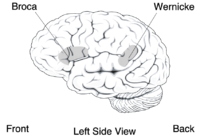linguistics
- For a topical guide of this subject, see Outline of linguistics
linguisticsLinguistics is the scientific study of language. Linguistics is based on a theoretical as well as a descriptive study of language and is also interlinked with the applied fields of language studies and language learning, which entails the study of specific languages. Before the 20th century, linguistics evolved in conjunction with literary study and did not employ scientific methods. Modern-day linguistics is considered a science because it entails a comprehensive, systematic, objective, and precise analysis of all aspects of language – i.e., the cognitive, the social, the cultural, the psychological, the environmental, the biological, the literary, the grammatical, the paleographical, and the structural. Traditional areas of linguistic analysis correspond to syntax (rules governing the structure of sentences), semantics (meaning), morphology (structure of words), phonetics (speech sounds and equivalent gestures in sign languages), phonology (the abstract sound system of a particular language), and pragmatics (how social context contributes to meaning). Subdisciplines such as biolinguistics (the study of the biological variables and evolution of language) and psycholinguistics (the study of psychological factors in human language) bridge many of these divisions. Linguistics encompasses many branches and subfields that span both theoretical and practical applications. Theoretical linguistics (including traditional descriptive linguistics) is concerned with understanding the universal and fundamental nature of language and developing a general theoretical framework for describing it. Applied linguistics seeks to utilise the scientific findings of the study of language for practical purposes, such as developing methods of improving language education and literacy. Linguistic features may be studied through a variety of perspectives: synchronically (by describing the shifts in a language at a certain specific point of time) or diachronically (through the historical development of language over several periods of time), in monolinguals or in multilinguals, amongst children or amongst adults, in terms of how it is being learned or how it was acquired, as abstract objects or as cognitive structures, through written texts or through oral elicitation, and finally through mechanical data collection or through practical fieldwork. (Full article...) Selected article -Mayan languages are a language family spoken in Mesoamerica and northern Central America. Mayan languages are spoken by at least 6 million indigenous Maya, primarily in Guatemala, Mexico, and Belize. The Mayan language family is one of the best documented and most studied in the Americas. Modern Mayan languages descend from Proto-Mayan, a language thought to have been spoken at least 5000 years ago; it has been partially reconstructed using the comparative method. Mayan languages form part of the Mesoamerican Linguistic Area, an area of linguistic convergence developed throughout millennia of interaction between the peoples of Mesoamerica. All Mayan languages display the basic diagnostic traits of this linguistic area. During the pre-Columbian era of Mesoamerican history, some Mayan languages were written in the Maya hieroglyphic script. Its use was particularly widespread during the Classic period of Maya civilization. The surviving corpus of over 10,000 known individual Maya inscriptions on buildings, monuments, pottery and bark-paper codices, combined with the rich postcolonial literature in Mayan languages written in the Latin alphabet, provides a basis for the modern understanding of pre-Columbian history unparalleled in the Americas. (more...) Did you know...From Wikipedia's "Did You Know" archives: 
Related PortalsThings you can do
WikiProjectsThe following WikiProjects work to improve topics concerned with linguistics:
Associated WikiThe following Wiki Foundation sister projects provide more on this subject: Discover Wikipedia using portals |
This article uses material from the Wikipedia English article Portal:Linguistics, which is released under the Creative Commons Attribution-ShareAlike 3.0 license ("CC BY-SA 3.0"); additional terms may apply (view authors). Content is available under CC BY-SA 4.0 unless otherwise noted. Images, videos and audio are available under their respective licenses.
®Wikipedia is a registered trademark of the Wiki Foundation, Inc. Wiki English (DUHOCTRUNGQUOC.VN) is an independent company and has no affiliation with Wiki Foundation.







